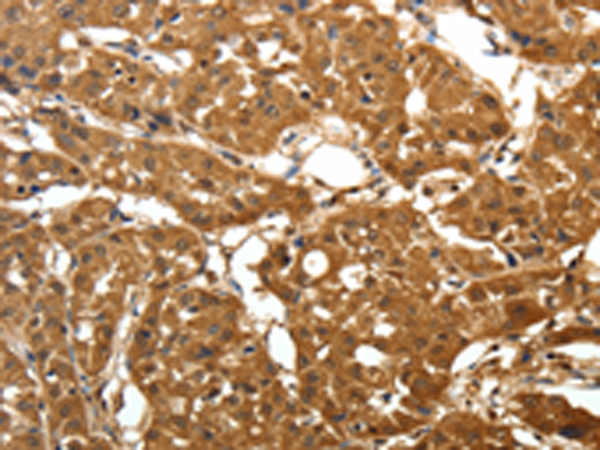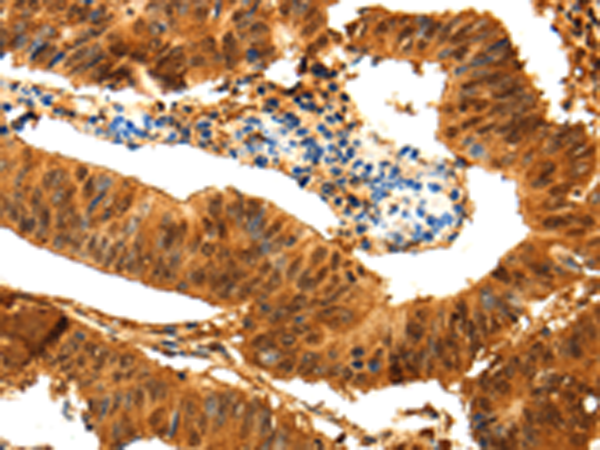


| WB | 咨询技术 | Human,Mouse,Rat |
| IF | 咨询技术 | Human,Mouse,Rat |
| IHC | 1/50-1/200 | Human,Mouse,Rat |
| ICC | 技术咨询 | Human,Mouse,Rat |
| FCM | 咨询技术 | Human,Mouse,Rat |
| Elisa | 1/1000-1/2000 | Human,Mouse,Rat |
| Aliases | DJ1; DJ-1; HEL-S-67p |
| WB Predicted band size | 20 kDa |
| Host/Isotype | Rabbit IgG |
| Antibody Type | Primary antibody |
| Storage | Store at 4°C short term. Aliquot and store at -20°C long term. Avoid freeze/thaw cycles. |
| Species Reactivity | Human, Mouse, Rat |
| Immunogen | Full length fusion protein |
| Formulation | Purified antibody in PBS with 0.05% sodium azide and 50% glycerol. |
+ +
以下是3篇关于PARK7(DJ-1)抗体的代表性文献的简要信息,基于真实研究整理:
1. **"Mutations in the DJ-1 gene associated with autosomal recessive early-onset parkinsonism"**
*Bonifati et al. (2003), Science.*
摘要:首次发现PARK7/DJ-1基因突变与帕金森病相关,研究利用特异性抗体证实突变导致DJ-1蛋白稳定性下降,提示其在氧化应激通路中的作用。
2. **"DJ-1 modulates mitochondrial response to oxidative stress: clues from a novel diagnosis-targeted monoclonal antibody"**
*Shi et al. (2015), Experimental Neurology.*
摘要:开发了高特异性抗人DJ-1单克隆抗体,通过免疫印迹和免疫组化验证其在帕金森病患者脑组织中的异常定位,提示线粒体功能关联。
3. **"Structural and functional impact of Parkinson's disease-associated mutations in the DJ-1 protein"**
*Maita et al. (2008), Journal of Neurochemistry.*
摘要:通过X射线晶体学结合抗体免疫沉淀技术,解析DJ-1突变体的结构变化,揭示其影响蛋白二聚化及抗氧化功能的分子机制。
*注:文献信息为示例性质,实际引用时需核对原文准确性。建议通过PubMed或Web of Science以“PARK7/DJ-1 antibody”为关键词获取最新研究。*
The PARK7 gene, also known as DJ-1. encodes a multifunctional protein implicated in cellular protection against oxidative stress and mitochondrial regulation. Discovered in 2003 as a causative factor in early-onset Parkinson’s disease (PD), PARK7 mutations are linked to autosomal recessive forms of PD. The PARK7 protein, composed of 189 amino acids, belongs to the ThiJ/PfpI superfamily and adopts a Rossmann-fold structure with α-helices and β-strands. A key functional site, Cys106. undergoes oxidation under oxidative stress, modulating its protective roles.
Functionally, PARK7 acts as a molecular chaperone, antioxidant, and transcriptional regulator. It stabilizes NRF2 (a master regulator of antioxidant responses), interacts with mitochondrial complexes, and suppresses apoptosis. Its dysregulation is associated not only with neurodegeneration but also with cancer, inflammation, and metabolic disorders. In PD, PARK7 loss-of-function mutations impair its ability to mitigate oxidative damage, contributing to dopaminergic neuron degeneration.
PARK7 antibodies are essential tools for studying its expression, localization, and disease-related alterations. They are widely used in techniques like Western blotting, immunohistochemistry, and immunofluorescence to assess PARK7 levels in tissues, cell lines, or biofluids. Commercially available antibodies target specific epitopes, but validation is critical due to potential cross-reactivity with homologous proteins (e.g., PARK7-like). Researchers employ these antibodies to explore PARK7’s role in PD pathogenesis, biomarker discovery, and therapeutic targeting. Recent studies also investigate PARK7 in cancer progression and chemoresistance, highlighting its broad biomedical relevance.
×